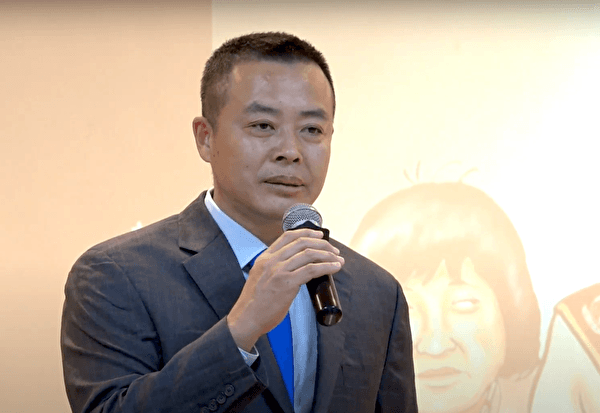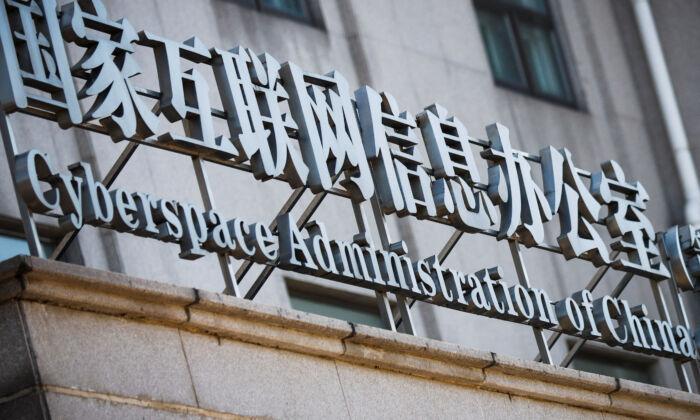Instead, Zhao says, the “crimes” are concerted acts carried out by the communist regime and its peripheral companies in the course of its online public opinion management process. When such acts are overdone and tragedies of different kinds occur, the regime blames ordinary Chinese netizens. The draft guideline is a typical tactic of the regime: blaming the Chinese public for its own misdeeds, Zhao said.
“It’s a business that caters to the needs of the authorities,” Zhao said. The goal is to maintain a stable and harmonious internet ecosystem for the ruling Chinese Communist Party (CCP), he said, by “drowning out” the normal and logical cognitive functions of ordinary citizens with massive quantities of false arguments.
The authorities, in this case, are Xi Jinping—the Communist Party leader—and his loyal followers in the Office of the Central Cyberspace Affairs Commission (or “the Commission”).
According to Zhao, Chinese cyberspace appears to be a network of “netizens” communicating and commenting on events. However, Zhao says that this network is, essentially, fabricated. Issues trending on the Chinese internet and popular posts online are actually being pushed and amplified according to orders from the Commission—which is how Communist Party offices, local authorities, and private businesses in China physically manipulate the perception of “public opinion” online.
It’s All a Business
The Chinese Internet is a gigantic information-management industry, with trillions of items of information manipulated and exploited by three entities, Zhao said: the communist authorities, both state and private media, and public relations companies.Zhao used to work for a major internet company in China, and he used his former employer as an example.
Zhao’s former company had a department that engaged in software development and implementation—with the goal of facilitating the systemic management and direction of public opinion. The elder brother of his department’s leader was a deputy state-level official, he said.
According to Zhao, Chinese internet company CEOs are well connected to their overlords in Zhongnanhai—the political center of the Chinese Communist Party.
Zhao said that as much as 10 years ago, agencies at all levels in the Chinese regime were equipped with his company’s software—and four major Chinese internet companies were involved in providing ancillary services required to operate it.
At that time, manual intervention played a major role, as artificial intelligence (AI) was not as advanced as today. The software searched for “negative information” on the internet and on Chinese social media, such as WeChat, Weibo, blogging platforms, and more.
The software screened the posts and information it found against lists of major officials in the communist regime, serving as a “fire extinguisher” to eliminate any posts that might have a negative impact on those officials.
The authorities and the local cyberspace management departments operated multiple access points for direct connection to the information found on the Chinese internet. Designated public relations companies also helped filter out problematic content.
Zhao said, “These public relations companies are what’s known as the ‘Internet Fire Brigade.’”
He explained that China’s internet operates as a business. The PR companies hire individuals to manage multiple fake accounts, spreading posts of well-crafted content—with the mission of interpreting and guiding the direction in which a given topic should go.
The companies would also pay popular bloggers—verified Weibo bloggers with more than 500,000 followers, known as “Big V”—to repost and assist the trending process. “The Big V receive a lot of money from the PR companies,” he said.
Finally, there’s a team of people in charge of deleting censored posts.
What is trending online in China is all man-made, he said, “including the keywords … it’s all planned, none of it is objective or regular. It’s all controlled.”

The Instructions
Zhao said that the CCP developed both the philosophy and the means required to control online opinion years ago.In 2015, the People’s Daily Press published a training manual titled “Work Guide for Network Public Opinion,” which was written for cadres in leadership, spokespersons, commentators, and public opinion analysts.
The guide presented strategies and plans to manipulate online content—according to images captured from the manual.
Zhao used a recent online bullying incident in China as an example to illustrate how the authorities there claim they are fighting online bullying—and to show what can actually happen behind the scenes.
Chinese media blamed the suicide of a young mother in Wuhan, central China on June 2 on the social media-led criticism of her intention to become an online celebrity. The young woman announced her intentions after the death of her six-year-old son—who was run over by a teacher’s car in his school compound.
Chinese media claimed that netizens then bullied and scorned the woman online, with comments such as “her son was no good,” “the mom was acting,” etc. As a result, the media claimed, she jumped from a high-rise building about 10 days after her son was killed on May 23.
The authorities said she had died due to “online violence”—and deleted the malicious comments and accounts.
However, a video later emerged that showed the mother complaining about how she was being harassed by a local police officer named Zhou Jun.
According to Zhao Lanjian’s analysis, police officer Zhou was likely acting on orders as part of a concerted plan of online opinion management.
Local authorities dispatched a large police force to the school where her son had died when the mother was expressing, on internet platforms, her hopes that the school would apologize for the wrongful death of her son.
However, reports suggest that the teacher involved in her son’s death belongs to a privileged family in the district. Zhao said he believes it was easy for the authorities to conduct police coercion on the young mother to keep her quiet, while flooding the Chinese internet with negative posts to drown out the woman’s voice. He said, “I know it can be done, because it was part of my work in the past.”
Zhao said that the Chinese public has become blind to the CCP’s tactics, making it second nature for them to accept the claims of the regime—and acknowledge its claims of “online violence.”




